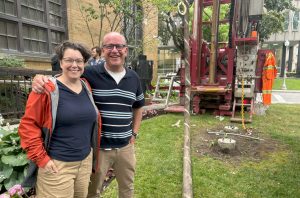At my family’s seder each year we act out the following scene: my father—who has led our seders in the years since my grandfather’s passing—places the afikoman bag over his shoulder and asks the rest of us in Judeo-Arabic:
“Miwen jaiye?” [From where are you coming?]. We answer: “Mi-Mitzrayim” [From Egypt]. “Lawen rayech?” [Where are you going?] “Li-Yerushalayim” [To Jerusalem]. “Ishu zawatak?” [What are your provisions?] “Matzvah u’maror.”
That first question, for us, has a particular resonance. My grandparents did not flee Egypt as slaves, yet 65 years ago they were still forced to leave.
Though the people of Israel left Egypt to become a nation in the days of the Torah, from the time of the destruction of the First Temple there had been a thriving Jewish presence in that land. My grandfather, born in Cairo in 1917, had spent his whole life in the country and when he married my grandmother in 1955, who had lived until then in Beirut, she came to join him. As newlyweds they intended to build the rest of their lives in Egypt. In 1956, my father’s oldest sister was born there.

Yet, as we know, things began to turn sour for the Jews of Egypt when Gamal Abdel Nasser came to power in 1954. In 1957, my grandparents left as refugees, bringing nearly nothing with them into exile. Together they fled to Lebanon, where most of my grandmother’s family still lived. With some strong convincing by family members, what was intended to be a three-day stop on the way to Brazil became a 10-year sojourn in Beirut.
Two more children and some years later, my grandparents remained determined to emigrate, and eventually settled on Montreal. My father’s eldest sister, who by then had been in school for some years at the Alliance Israélite Universelle, seemed especially cool in the eyes of her peers as she was going to the city of the upcoming Expo 67, about which they had heard on TV.
Arrangements were made with assistance from the Jewish Immigrant Aid Service (JIAS), and by April 1967 everything was finally in order. With the excitement of something new ahead, though accompanied by the sadness of leaving family, the Srour family began their journey. For the occasion my grandparents ensured they were all dressed in new clothing. My grandfather wore a new suit, as did my father, who was all of five years old. The family flew from Beirut via Rome and Amsterdam to New York (where my father and his sister were highly amused by the automatic doors, the likes of which they had never seen before), and finally to Montreal, arriving on April 19.

In those first days everything was new, and there was much to explore in their new city. It was the beginning of spring in Montreal and the air was fresh and crisp, in a way they had not experienced in Lebanon. And it was cold. Well, at least to them, who had not yet acclimatized to the weather. Yet the locals were perplexingly eating ice cream! Even the milk was new.
On one of the first mornings in Montreal my grandfather went out to find milk and was surprised to learn that in Canada, the milk was cold. They had only used powdered milk before, never fresh, and they were afraid that it was not safe to consume. My father and his siblings made liberal use of the hotel room television, and were excited to find in syndication many of the shows they’d enjoyed watching in their old country.
The Montreal Jewish community my family encountered was warm and welcoming. When they arrived, it was just days before Pesach. As new immigrants, my grandparents worried about how they would get by. Before long, they received an invitation to the community seder at the YMHA. The evening was long, there weren’t many other children, and it was not according to their tradition. The food took a long time to arrive and was unfamiliar—this was certainly their first time encountering gefilte fish! Everything felt, tasted, and was different. Yet among all that was a feeling of immense comfort in and gratitude to this new community.
This was the beginning of their life in Montreal. There are so many more wonderful stories to share about my family, as Lebanese and Egyptian Jewish immigrants who came to Montreal in the 1960s, just one month before the Six Day War (which would profoundly impact the situation of Jews in the Arab world). But in the story of my family, Pesach holds special significance. Sixty-five years ago, my grandparents left Egypt. Fifty-five years ago, they left Lebanon and came to Canada. This year, after two years apart, my family will come together for the seders and raise a special toast to our own, personal exodus.







